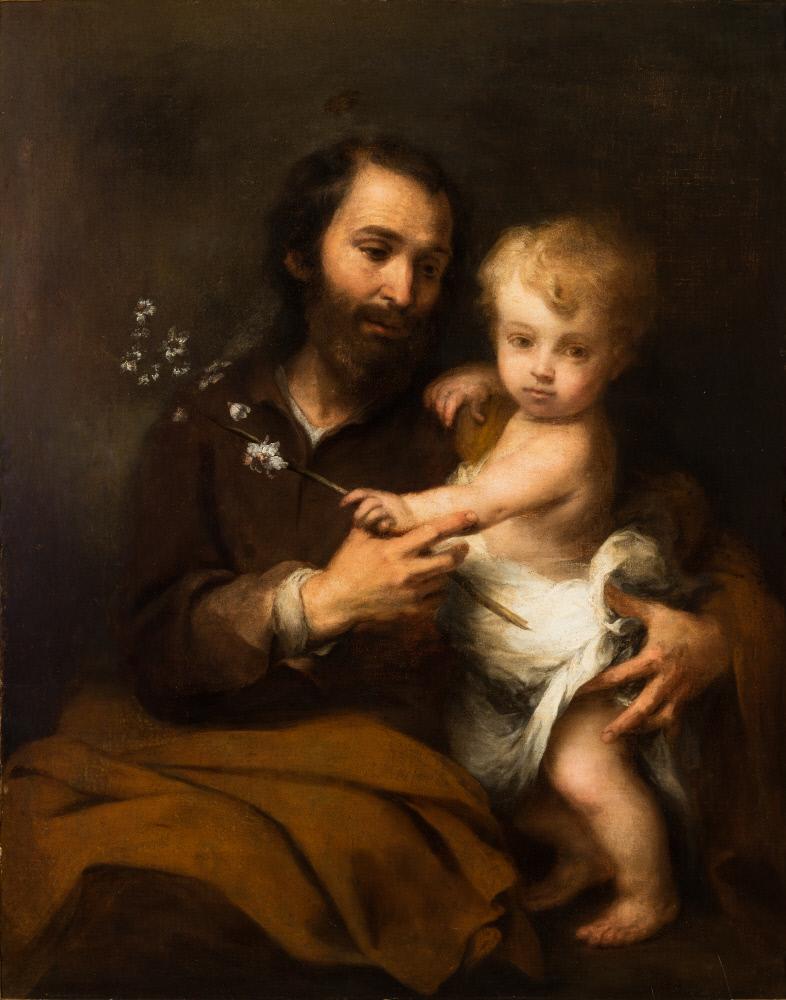During these early weeks following the death of Pope Francis, the May 1st Feast of Saint Joseph the Worker provides a particularly fitting opportunity this year to turn to the Holy Father’s own teaching on the beloved, saintly foster father of Jesus.
On December 8, 2020, Pope Francis issued an Apostolic Letter entitled Patris Corde (With a Father’s Heart), initiating the special Year of Saint Joseph. Our reflection is based on this papal document, which begins: “With a Father’s Heart: that is how Joseph loved Jesus, whom all four Gospels refer to as ‘the son of Joseph.’”
Introducing Joseph as “a lowly carpenter … betrothed to Mary … a just man,” Pope Francis then enumerated seven aspects of Saint Joseph’s character which broaden our perspective on him, leading us beyond the carpenter shop.
~ A beloved father: Joseph was beloved by Jesus as the earthly father who protected and provided for Him and for His mother Mary in every way. Joseph’s gentle, loving care for them was a constant in their lives; he would have rejoiced with them in happy times and supported them during difficult ones.
Pope Francis portrayed Saint Joseph as ever beloved, not only by Jesus and Mary but also by the entire Christian world, including great saints such as Teresa of Avila. He noted that love for Saint Joseph is memorialized in numerous churches, institutions, and groups carrying his name; and in the many popular prayers to him. Saint Joseph remains a true father figure beloved by many.
~ A tender and loving father: “Joseph saw Jesus grow daily ‘in wisdom and in years and in divine and human favor’ (Lk 2:52). As the Lord had done with Israel, so Joseph did with Jesus: he taught him to walk, taking him by the hand; he was for him like a father who raises an infant to his cheeks, bending down to him and feeding him’ (cf. Hos 11:3-4)”.
In our mind’s eye, we envision such touching scenes in which Saint Joseph, strong and manly as he was, displayed his tender side. As every good father, he guided Jesus, gently and tenderly, through all the usual phases of human growth, encouraging and teaching Him as He matured.
~ An obedient father: “Saint Luke is especially concerned to tell us that Jesus’ parents observed all the prescriptions of the Law; the rites of the circumcision of Jesus, the purification of Mary after childbirth, the offering of the firstborn to God (Lk 2:21-24).” As a devout Jewish husband and father, Joseph obediently carried out all that the Law required.
“As he had done with Mary, God revealed his saving plan to Joseph. He did so by using dreams …”. Saint Matthew recounts a series of dreams to which Joseph responded obediently, “with patient trust,” taking Mary as his wife and escorting her and Jesus on the arduous journeys to Egypt and back to Nazareth (Mt 1:20-21; 2:13-15; 2:19-23).
~ An accepting father: “The spiritual path that Joseph traces for us is not one that explains but accepts … Joseph is certainly not passively resigned, but courageously and firmly proactive … He did not look for shortcuts, but confronted reality with open eyes and accepted personal responsibility for it.”
These qualities shone forth especially during the early years of Jesus’ life, when the family was threatened by evil forces. Acceptance of those challenges and calm decision-making, based on faith and trust in God for guidance, were hallmarks of Joseph’s shepherding of his family during that troubling time.
~ A creatively courageous father: “[Creative courage] emerges especially in the way we deal with difficulties. In the face of difficulty, we can either give up and walk away, or somehow engage with it. At times, difficulties bring out resources we did not even think we had.”
The word difficulties hardly begins to describe the life challenges faced by the Holy Family from the very beginning and through the years. The familiar accounts of the trials of Jesus’ earliest days led into the years of hard manual labor and relative poverty at the home in Nazareth. All of these had the potential to “bring out resources” Saint Joseph “did not even think [he] had.”
~ A working father: “Saint Joseph was a carpenter who earned an honest living to provide for his family. From him, Jesus learned the value, the dignity and the joy of what it means to eat bread that is the fruit of one’s own labour … Saint Joseph’s work reminds us that God himself, in becoming man, did not disdain work.”
There is something beautiful and fulfilling about working with one’s hands, and even more so when a parent passes on knowledge and skill to a beloved child. Surely, Joseph and Jesus were tired at day’s end, but the long hours spent together in the carpentry shop would have provided great satisfaction, joy in each other’s company, and memories cherished by both.
~ A father in the shadows: “In his relationship to Jesus, Joseph was the earthly shadow of the heavenly Father: he watched over him and protected him … He never made himself the center of things. He did not think of himself, but focused instead on the lives of Mary and Jesus … [He] found happiness not in mere self-sacrifice but in self-gift.”
Reflecting on Saint Joseph as “the earthly shadow of the heavenly Father” gives us a particularly beautiful image on which to meditate as we consider the unique role he played as the foster father of Jesus. The one chosen for this incomparable honor was truly a man among men.
As we celebrate the Feast of Saint Joseph the Worker, we can recall his sterling qualities as Pope Francis described. We can ask for Saint Joseph’s help to emulate them in our own lives, taking him as our model.
Saint Joseph the Worker, pray for us!
© All Rights Reserved, Living His Life Abundantly®/Women of Grace® http://www.womenofgrace.com
Send your New Age questions to newage@womenofgrace.com










